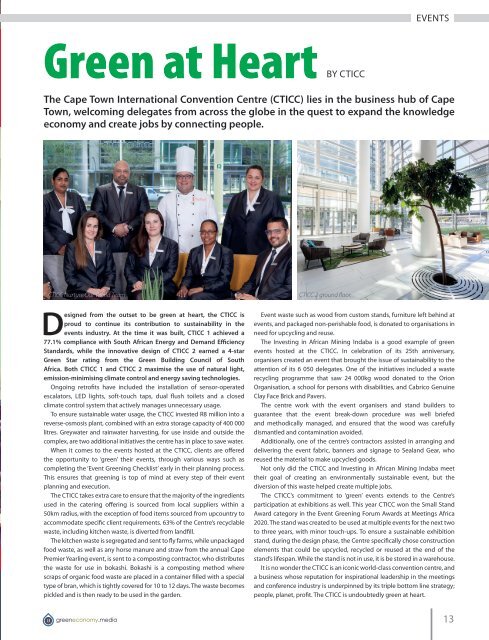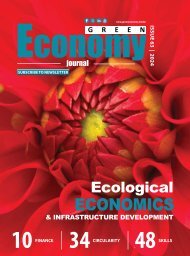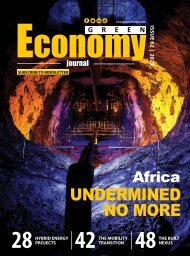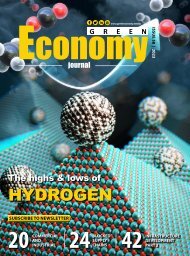Green Economy Journal Issue 41
You also want an ePaper? Increase the reach of your titles
YUMPU automatically turns print PDFs into web optimized ePapers that Google loves.
EVENTS<br />
<strong>Green</strong> at Heart BY<br />
CTICC<br />
The Cape Town International Convention Centre (CTICC) lies in the business hub of Cape<br />
Town, welcoming delegates from across the globe in the quest to expand the knowledge<br />
economy and create jobs by connecting people.<br />
CTICC Nurture Our World Team<br />
CTICC 2 ground floor.<br />
Designed from the outset to be green at heart, the CTICC is<br />
proud to continue its contribution to sustainability in the<br />
events industry. At the time it was built, CTICC 1 achieved a<br />
77.1% compliance with South African Energy and Demand Efficiency<br />
Standards, while the innovative design of CTICC 2 earned a 4-star<br />
<strong>Green</strong> Star rating from the <strong>Green</strong> Building Council of South<br />
Africa. Both CTICC 1 and CTICC 2 maximise the use of natural light,<br />
emission-minimising climate control and energy saving technologies.<br />
Ongoing retrofits have included the installation of sensor-operated<br />
escalators, LED lights, soft-touch taps, dual flush toilets and a closed<br />
climate control system that actively manages unnecessary usage.<br />
To ensure sustainable water usage, the CTICC invested R8 million into a<br />
reverse-osmosis plant, combined with an extra storage capacity of 400 000<br />
litres. Greywater and rainwater harvesting, for use inside and outside the<br />
complex, are two additional initiatives the centre has in place to save water.<br />
When it comes to the events hosted at the CTICC, clients are offered<br />
the opportunity to ‘green’ their events, through various ways such as<br />
completing the ‘Event <strong>Green</strong>ing Checklist’ early in their planning process.<br />
This ensures that greening is top of mind at every step of their event<br />
planning and execution.<br />
The CTICC takes extra care to ensure that the majority of the ingredients<br />
used in the catering offering is sourced from local suppliers within a<br />
50km radius, with the exception of food items sourced from upcountry to<br />
accommodate specific client requirements. 63% of the Centre’s recyclable<br />
waste, including kitchen waste, is diverted from landfill.<br />
The kitchen waste is segregated and sent to fly farms, while unpackaged<br />
food waste, as well as any horse manure and straw from the annual Cape<br />
Premier Yearling event, is sent to a composting contractor, who distributes<br />
the waste for use in bokashi. Bokashi is a composting method where<br />
scraps of organic food waste are placed in a container filled with a special<br />
type of bran, which is tightly covered for 10 to 12 days. The waste becomes<br />
pickled and is then ready to be used in the garden.<br />
Event waste such as wood from custom stands, furniture left behind at<br />
events, and packaged non-perishable food, is donated to organisations in<br />
need for upcycling and reuse.<br />
The Investing in African Mining Indaba is a good example of green<br />
events hosted at the CTICC. In celebration of its 25th anniversary,<br />
organisers created an event that brought the issue of sustainability to the<br />
attention of its 6 050 delegates. One of the initiatives included a waste<br />
recycling programme that saw 24 000kg wood donated to the Orion<br />
Organisation, a school for persons with disabilities, and Cabrico Genuine<br />
Clay Face Brick and Pavers.<br />
The centre work with the event organisers and stand builders to<br />
guarantee that the event break-down procedure was well briefed<br />
and methodically managed, and ensured that the wood was carefully<br />
dismantled and contamination avoided.<br />
Additionally, one of the centre’s contractors assisted in arranging and<br />
delivering the event fabric, banners and signage to Sealand Gear, who<br />
reused the material to make upcycled goods.<br />
Not only did the CTICC and Investing in African Mining Indaba meet<br />
their goal of creating an environmentally sustainable event, but the<br />
diversion of this waste helped create multiple jobs.<br />
The CTICC’s commitment to ‘green’ events extends to the Centre’s<br />
participation at exhibitions as well. This year CTICC won the Small Stand<br />
Award category in the Event <strong>Green</strong>ing Forum Awards at Meetings Africa<br />
2020. The stand was created to be used at multiple events for the next two<br />
to three years, with minor touch-ups. To ensure a sustainable exhibition<br />
stand, during the design phase, the Centre specifically chose construction<br />
elements that could be upcycled, recycled or reused at the end of the<br />
stand’s lifespan. While the stand is not in use, it is be stored in a warehouse.<br />
It is no wonder the CTICC is an iconic world-class convention centre, and<br />
a business whose reputation for inspirational leadership in the meetings<br />
and conference industry is underpinned by its triple bottom line strategy;<br />
people, planet, profit. The CTICC is undoubtedly green at heart.<br />
greeneconomy.media<br />
13


















